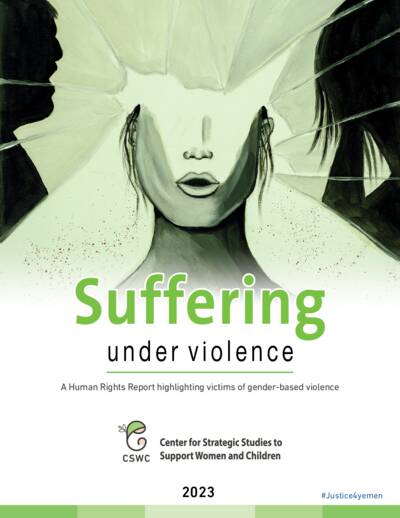Suffering under Violence" Report"

"Suffering under brunt of violence"
Legal Report for CSWC documenting 30 cases of Gender-based Violation in Taiz
The center for strategic studies to Support Women and Children(Cswc) has released its legal report entitled "Suffering under brunt of violence" which documents 30 gender-based violation case in distrects of ( Cairo, Shemayatian, Mudhafar, Salah, and Al-Mesrakh) in Taiz governorate during armed conflict from 2015 till 2022 within the project of " Supporting protection and advocacy mechanism for gender-based violence-Taiz"
The center declared that it it analyzed 15 case of the documented and checked cases during the team working in November 2022. The team has documented (76) case of gender-based violation of which (31)are women, (45)are children, and two women and a child were killed.
The report declared that two killing cases of two women, that occurred during the period of armed conflict, were monitored and documented in Saber Al-Misrakh district in 2021,and another case of a child-murder attempt.The offender in the two cases was the husband . The two victims were tortured, threatened and intimidated for long periods before being killed.
The report pointed out that two cases of physical assault were monitored and documented in which (5) women and (13) children were subjected to this type of gender-based violation during the years 2021 and 2022. , and the offenders were security authorities and the husband.In addition, five cases were monitored and documented in which two men, (10) women and (10) children were subjected to deprivation of resources and abuse, in addition to two cases of assault on the sanctity of the home and intimidating people in addition to looting the house.Moreover, One case of threatening a woman with her three children by killing was monitored and documented in which the victim was University doctor and political activist .
The report added that one case of sniping a woman and two children was monitored and documented, pointing out that this type of gender-based violations is one of the most prominent human rights violations against citizens in Yemen, especially women and children, in addition to monitoring and documenting one case of a woman from the marginalized people as one of the most exposed party to this kind of violation, whether from the family or society.
The report noted that the most prominent types of violation as identified within the scope of verified cases are murder, physical assault, deprivation from resources, ill-treatment, assault on home sanctity , looting and intimidation of people, in addition to murder threats and attacks on physical integrity, and at last freedom. Most of those violations to which the victim is subjected are complex and their spread is considered as a result of the conflict impact.
The report also illustrated that the interviews handled by the monitoring team with survivors,their relatives or witnessers had helped the center discover that there are similarities and differences in violation types in the targeted distrects(Mesrakh,Shamaytian,Ciro,Al mudhaffar,and Sala) during the same period in addition identifying perpetrators wether in public or private level.
Through monitoring, documentation and fact-checking, the report elicited that this violence against women is not reported and considered as an internal matter, so there is no accurate statistics on cases of domestic violence. Not to mention that the perpetrators of gender-based violations, in the cases documented, are from the family, either the husband or a family member, while in some cases the perpetrator was from the security authorities, extremist religious groups, or the conflict parties.
The report also concluded that the most of domestic violation cases are not known, and are treated as a private family affair that should not be talked about, as a result of the patriarchal culture of society. Besides, women's ignorance of their rights, the ways that should be followed to file complaints, the existence of legal gaps in other legal provisions, customary practices and misconceptions about women within police institutions during the submission of complaints, are all among the reasons that hinder women's access to justice.
The report added that impunity and lack of accountability for perpetrators is the prominent feature in most cases of violation that have been documented, even the most serious (premeditated murder).However, psychological pressure and the impact of conflict on perpetrators are taken as reasons to vendicate criminals. When in fact, it is an inevitable result of the weak role of the police and judicial authorities. In Overall, reforms must be included to ensure the full and effective implementation of legislative provisions aiming at combating violence.
#Justice4Yemen